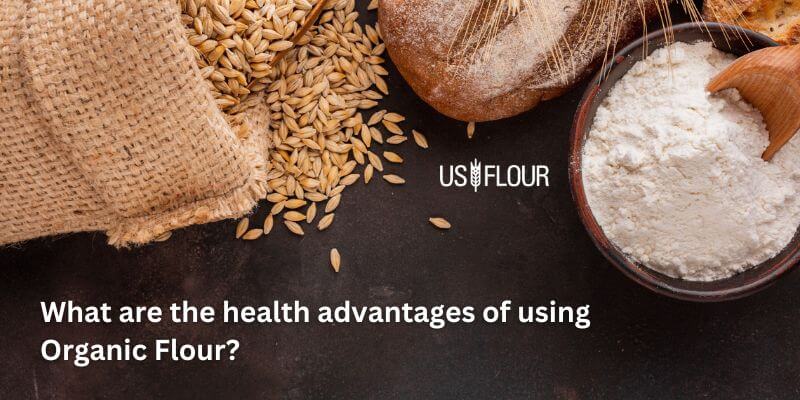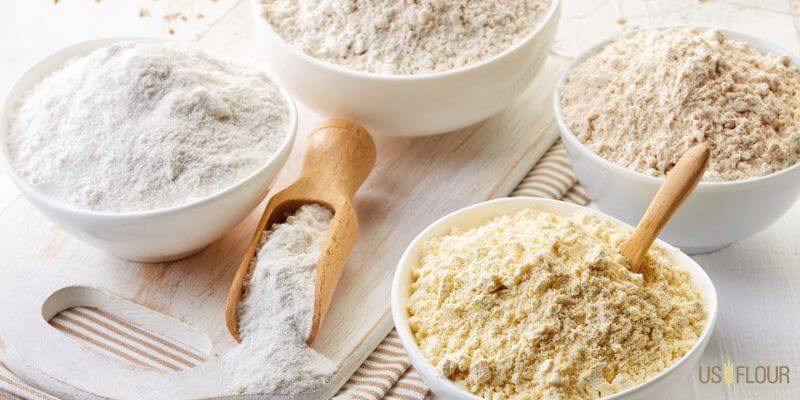What are the health advantages of using Organic Flour?

Grains are vital and nutritious staple foods for healthy consumption. But grain quality has depreciated over the years due to nutrient reduction. Therefore, there is a need for people who love consuming organic flour to stay vigilant for better health benefits.
According to research, organic flour is rich in antioxidants, minerals, and vitamins. But there are many more benefits attached to consuming organic flour, which helps the body’s overall functions. Read further to see some of these benefits and avail of them.
Benefits of organic flour

Because of the essential benefits of whole grain wheat varieties, you can use organic flour for food production, such as baking and cooking. Everyone wants to consume food products that provide top-notch health benefits, and organic flour contains such benefits. Fortunately, many manufacturers mill organic flour from chemical-free grains.
Therefore, quality grains used to obtain the best organic flour are not contaminated by synthetic pesticides. In addition, organic flour has many nutritional benefits that can help boost a consumer’s health, including being highly protein-rich. Remember that when you have the appropriate amount of protein needed for your body to work as well as it should, it can guarantee your mental and physical development.
What’s more? Organic flour is good for you because it helps the body enhance its insulin response. Organic flour also contains high amounts of zinc and magnesium, which help in the proper regulation of blood sugar. As a result, consistent consumption of organic flour can even lower the risk of diabetes in the future.
The following are the top benefits of organic flour:
1. Organic flour is critical for bone development
You can compare organic flour with processed and refined whole wheat flour, which contains a high rate of phosphorus. The body needs phosphorus, a vital mineral combined with calcium, to develop stronger bones. You and your loved ones can get the essential benefits of organic flour through delicious diets or items like buns and brown bread.
2. Organic flour can help in the improvement of body metabolism
Since organic flour has a high level of vitamin B1, which is needed to support the metabolic actions of glucose in the body, it also aids in processing energy obtained from food by adenosine triphosphate (ATP).
3. Organic flour can help eliminate diabetes
Organic flour contains magnesium, one of the essential compounds. Magnesium is highly beneficial to health as it helps improve the body’s insulin response. In addition, your body can help reduce the resistance it has when responding to insulin. Therefore, magnesium in organic flour works with elements of zinc to help regulate sugar in the blood and prevent diabetes from occurring.
4. Organic flour can aid in brain power improvement
Since organic flours are essentially rich in niacin, an element that aids in the best improvement and functioning of the human brain, anything that improves brain function positively affects overall mental health. So, it would help if you had organic flour to do this to your mental health.
You and your loved ones can consume fast recipes of organic flour to get the Niacin enrichment in your daily breakfast diets. Eating healthy in themorning improves your body’s energy, helping you stay active all day.
5. Organic flour contains considerable amounts of folic acid
In organic flour, you can find vitamin B9, or folic acid, which helps create and control the body’s red blood cells. Aside from that, folic acid is excellent for preventing DNA alterations, which cause changes that lead to cancer damage.
6. Organic Flour Can Help in the Prevention of Anemia
With whole wheat organic flour in your daily consumption, you can eliminate an existing anemic problem and prevent futuristic chances of having anemia in your body. In addition, good diets like organic flour provide the body with sufficient iron through consistent consumption.
So, starting the day by consuming nutritional diets with organic flour will be a good thing to help prevent anemia. If you want quicker results, you can benefit from organic flour by combining it with different kinds of fruits and vegetable leaves.
7. Organic flour is high in protein

You might already know about the health benefits of consuming nutritional diets that contain organic flour, as many people believe that organic flour contains sufficient protein that the body needs. They are not far from the truth since protein is an excellent source of organic wheat flour. In addition, it improves the mental and physical states of the body.
It can sound casual to say that organic flour can be part of a healthy diet with high protein benefits and be one of the best boosts to mental and physical development. But this happens due to the presence of vital minerals and vitamins. In addition, eating diets made of organic flour can enhance your skin, eyes, and hair. It simply rejuvenates you.
Organic flour also contains moderate amounts of zinc, which the body needs to perform the same functions of body repair. Therefore, zinc elements can slow the aging process through internal repairs. You cannot measure the overall energy you obtain every day from consuming nutritional diets made of organic flour with the energy you get from many other diets during the early hours of the day.
You can receive proper health-related benefits from your breakfast diet containing organic wheat flour. Or, you can add other organic wheat or whole grains and fix yourself a breakfast that contains multiple grains for more protein benefits.
Conclusion
Remember that you need good health to stay stronger. When you consume a good amount of organic flour for baking and cooking, you and your family receive the best diets that supply the body’s multiple benefits.
Many individuals who begin the day with organic flour in their meals claim that staying active and healthy throughout the day and maintaining the body mass index are possible. It would help if you had organic flour to boost your energy and had the right amounts of vitamins, proteins, phosphorus, magnesium, calcium, and zinc in your body.
 Power to The Bakers.
Power to The Bakers.